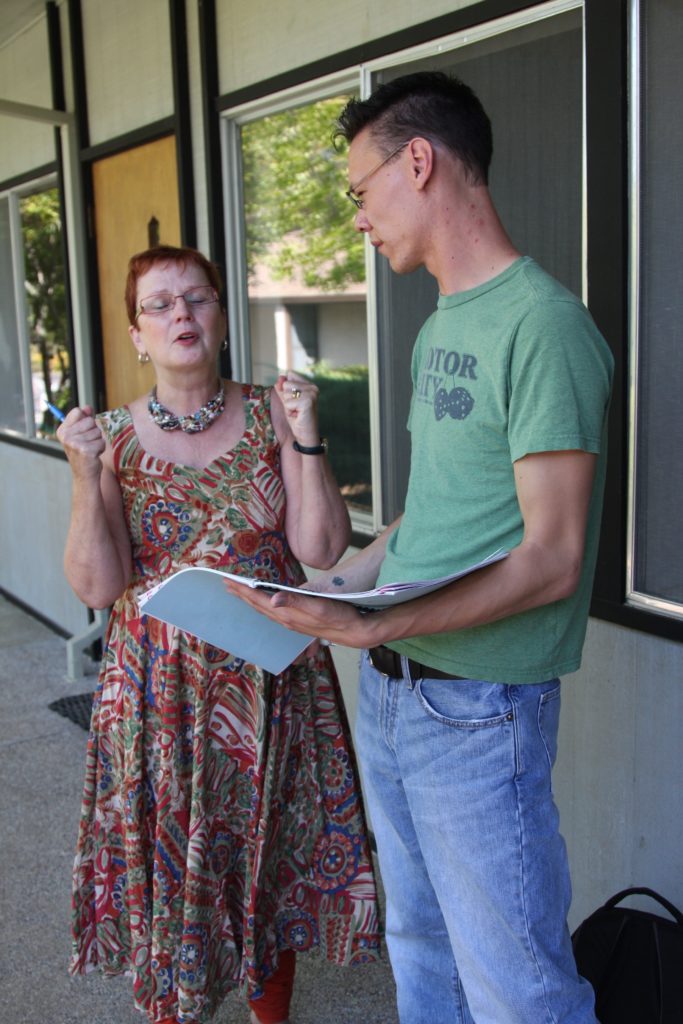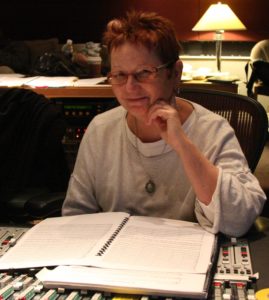Program Notes
From composer Mona Lyn Reese
 In Choose Life, I use themes and harmony to represent the emotions or characteristics of the singers. Adonai, the God of Israel, and Lazar, the Jew, sing pieces that use modal, traditional Jewish harmony. I used this sound because I wanted the image of Adonai, the God in the prayers of the victims, to be Jewish. Adonai listens to everyone’s prayers, but our visualization of God reflects our own image.
In Choose Life, I use themes and harmony to represent the emotions or characteristics of the singers. Adonai, the God of Israel, and Lazar, the Jew, sing pieces that use modal, traditional Jewish harmony. I used this sound because I wanted the image of Adonai, the God in the prayers of the victims, to be Jewish. Adonai listens to everyone’s prayers, but our visualization of God reflects our own image.
Two musical thoughts occur throughout the piece. The first I call the abandon theme, a descending chromatic scale; and the sigh or weep motive, a slurred, descending minor second that has been used for centuries to mean sorrow and grieving. The first two arias—“Hear Me, My People,” and “Holy One Beyond the Stars”—are spiritually and thematically connected. In these arias, Adonai and Lazar have a parallel conversation where Adonai tells his people to choose life; even though they don’t understand his thoughts and ways. Lazar considers he has chosen life, but Adonai has abandoned him to death. The abandon theme first occurs in Lazar’s aria.
In “O God of Israel,” the Hebrew Chorus shouts at Adonai. They are angry because they too, feel God has abandoned them. As I wrote this piece, I thought of the words Jesus cried out as He hung on the cross, “My God, Why hast thou forsaken me?” The forsaken, abandoned feeling is expressed in the abandon theme.
In Jewish tradition, Rachel is the personification of the loving mother. In “A Voice Was Heard in Ramah,” the women take the part of Rachel, the mother. When the men declaim they’ve seen and heard the deaths of children, the women’s grief-stricken response contracts the half-step weep motive into a dissonant interval.
Jews were not the only ones persecuted in the Holocaust. The widow of a righteous gentile mourns her husband in “The Death of Franz,” I used sinister harmony and texture to represent the evil she faced. The wide intervals and sweeping melody express the moral confusion she feels between her pride in her husband for choosing his honor and her anger with him for leaving her.
Dives, the indifferent citizen, is sorry for ignoring the suffering and fate of the Jews. I based “I Was Absent” on Kyrie XI. The Kyrie is a part of the mass where the people sing: Kyrie eleison, Christe eleison kyrie eleison; Lord have mercy, Christ have mercy, Lord have mercy. Dives can’t forgive himself for his indifference. He sings a kyrie and asks for forgiveness. Adam responds with the prayer, “Tender God Have Mercy,” a hymn in the Christian tradition.
 The motet “All Ye Who Pass By” echoes the fifteenth century polyphonic style. The weep motive occurs in all voices throughout the piece which is the most sorrowful point in the whole work. Jacob’s simple verse anthem, “Stay with Me God,” relieves the tension and sorrow of the other pieces. Here trust banishes fear; and the people begin to be strong. A verse anthem comes from the Anglican church tradition; it is similar to a motet but includes a soloist. The Anglican-sounding harmony represents innocence.
The motet “All Ye Who Pass By” echoes the fifteenth century polyphonic style. The weep motive occurs in all voices throughout the piece which is the most sorrowful point in the whole work. Jacob’s simple verse anthem, “Stay with Me God,” relieves the tension and sorrow of the other pieces. Here trust banishes fear; and the people begin to be strong. A verse anthem comes from the Anglican church tradition; it is similar to a motet but includes a soloist. The Anglican-sounding harmony represents innocence.
The next four pieces, derived from Lazar and Adonai’s arias and chants from the Angel Choir, recapitulate the spiritual and thematic connection of the first part of the work. In Your Likeness combines the Gregorian chant “Lux Aeterna” and the Hebrew melody “Ani Maamin.”
The focus of “Adonai, We Will Not Forget” is a determination to overcome evil. I wanted to express the drive and will of the people. This piece contrasts a static choir melody with a complex, jagged orchestra accompaniment. The choir sings only five pitches—C, D, E, E-flat, and F.
The trio “Choose Life” uses melodic material from each solo aria and a popular song, Dona Dona, that is often associated with the Holocaust. The harmony and melody are positive and hopeful; each character comes to terms with his or her struggle and chooses life. “I Shall Not Die” joyfully affirms the decision to choose life over death and trust God. The new bell theme, first heard in the Angel choir, is the basis for all harmony and melody in the anthem.
